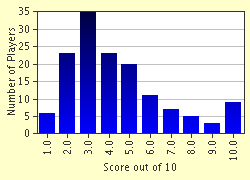Quiz Answer Key and Fun Facts
1. What was the name of the governor of Missouri who, in 1861, defied Lincoln's order to muster troops for Federal Service, and also organized the secessionist State Guard in an attempt to move the state toward secession?
2. What was the name of the series of meetings that culminated with the June 19, 1861 vote which repealed the Ordinance of Secession of Virginia, thus resulting in the formation of the NEW State of West Virginia?
3. On March 3, 1865, Congress authorized the formation of what agency?
4. In 1864, a newspaper published a fake Proclamation from Lincoln calling for 400,000 more troops. The public assumed that the war was going badly for the North. This led, among other things, to a rise in the price of gold. What were the names of the two journalists responsible for the 1864 "Gold Hoax?"
5. Many young men on the Union side reaped the benefits of victory after the war. Some went on to hold prominent governmental positions. Even Lincoln's private secretary John Hay held a high post. What position did Hay go on to hold?
6. When George McClellan ran for President in 1864, who was his running mate?
7. On what date was the National Currency Act signed into law?
8. In July of 1864, Lincoln pocket-vetoed a reconstruction bill. What were the names of the bill's sponsors?
9. Who replaced Salmon Chase as Lincoln's Secretary of the Treasury?
10. On the day Lincoln died, he met with not only the cabinet but also several other people. One of the individuals with which Lincoln met was the newly appointed Minister to Spain. What was the name of this individual?
Source: Author
bigbaddoc
This quiz was reviewed by FunTrivia editor
bloomsby before going online.
Any errors found in FunTrivia content are routinely corrected through our feedback system.

